تصاویر یخچالهای طبیعی دیدنی جهان
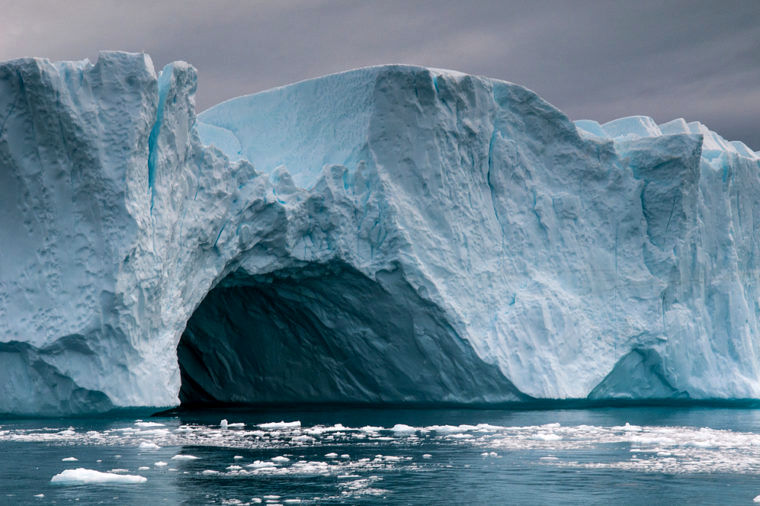
* نام عکاس، محل ثبت تصویر و توضیحات مربوطه در پایین هر تصویر به زبان انگلیسی درج شده است.
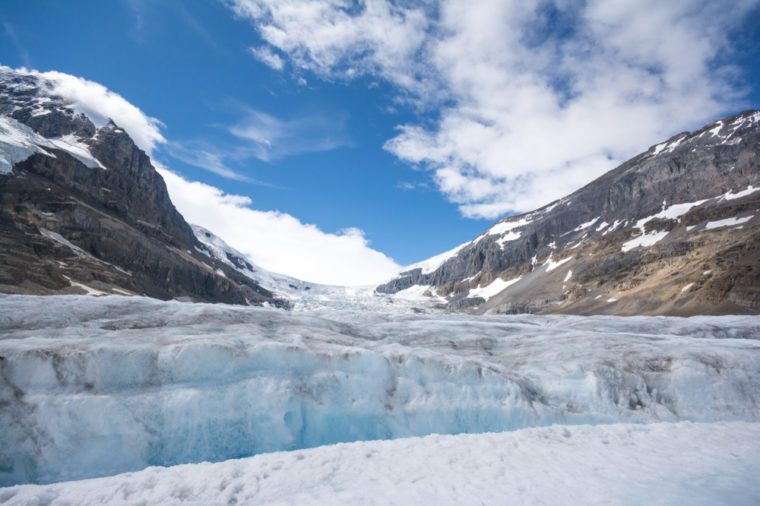
EDWIN CHRISTOPHER/SHUTTERSTOCK
Athabasca Glacier, Canada
The Athabasca Glacier is located in Jasper National Park in the Canadian Rockies. It’s the most accessible glacier in Canada and the most visited glacier in North America. Going under the ice requires special clearance, but the explorers who have describe miles of tunnels and shafts. Unfortunately, every year the Athabasca Glacier has been receding about 16 feet, leading scientists to believe it’ll disappear within a generation. Take a look at these draw-dropping photos of the world’s most beautiful countries.

BLUE PLANET STUDIO/SHUTTERSTOCK
Tasman Glacier, New Zealand
Almost 17 miles long and about two-and-a-half miles wide, Tasman Glacier is the longest glacier in all of New Zealand. The glacier is located in the Aoraki Mount Cook National Park, and travelers can sign up for boat tours on the adjacent terminal lake or take a guided 4WD tour. Speaking of glaciers, you won’t believe how this man survived when he fell into one.
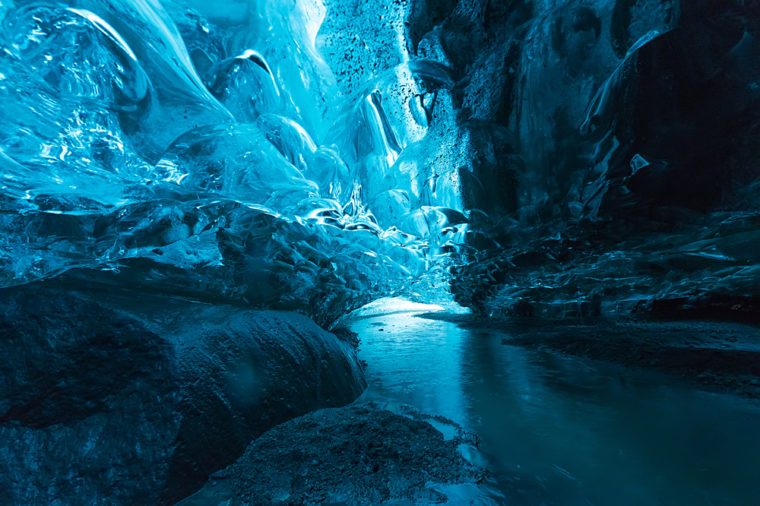
EMEI/SHUTTERSTOCK
Vatnajokull Glacier, Iceland
As the largest glacier in Iceland, this 1.3-mile-long natural wonder covers between roughly 3,127 and 3,205 square miles. Its thickest point measures just over 3,280 feet with an average thickness measuring between about 1,312 and 1,640 feet. According to icelandontheweb.com, “The total ice volume of Vatnajokull is probably in the vicinity of 3300 cubic km [792 cubic miles].” Considering its massive volume, it comes as no surprise that there is a lot beneath its surface—starting with seven separate volcanoes, the majority of which are active. Learn about some amazing active volcanoes you can actually visit.

S.TOMAS/SHUTTERSTOCK
Jakobshavn Glacier, Greenland
Despite Jakobshavn Glacier’s beauty, this natural wonder is blamed for sinking the famous Titanic. According to NASA scientists, the glacier has been “surging forward at the rate of 150 feet per day.” In fact, the glacier moved almost three times as fast in 2012 as it did in the mid-1990s. These summer destinations are surprisingly gorgeous in the winter.
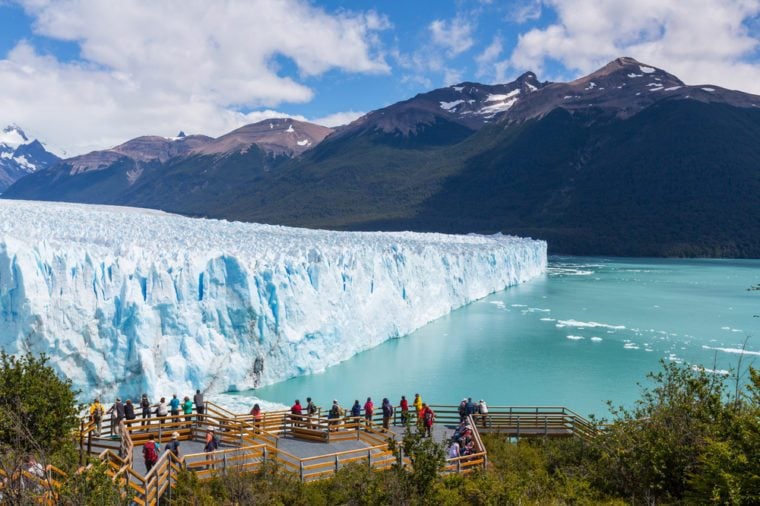
GALYNA ANDRUSHKO/SHUTTERSTOCK
Perito Moreno Glacier, Argentina
Perito Moreno Glacier is located in an ice field that’s part of the third-largest reserve of fresh water in the world (and it’s technically in both Argentina and Chile). Unlike many other glaciers around the world, Perito Moreno doesn’t show any signs of retreating: It spans 121 square miles and is still growing. With plenty of viewing platforms, walking paths, trekking tours, and a boat tour, there are tons of ways for visitors to check out this wonder. While you’re adding to your bucket list, don’t miss out on these beautiful natural pools around the world.
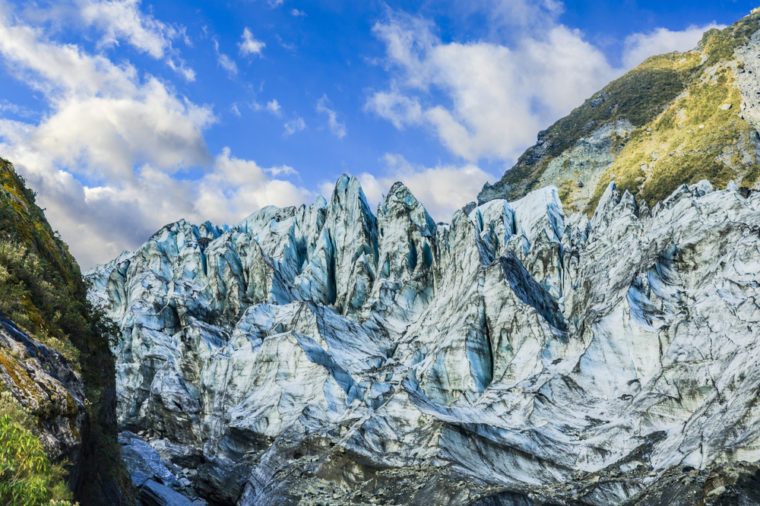
TRAVELLIGHT/SHUTTERSTOCK
Fox Glacier, New Zealand
Fox Glacier spans about eight miles in length and cascades down from the Southern Alps, measuring about 1.6 miles in height. Fox Glacier is supported by four alpine glaciers that receive about 98 feet of snow each year. To see Fox Glacier in person, visitors can take a guided glacier walk, a heli-tour, or a scenic flight, or simply walk to the terminal face.
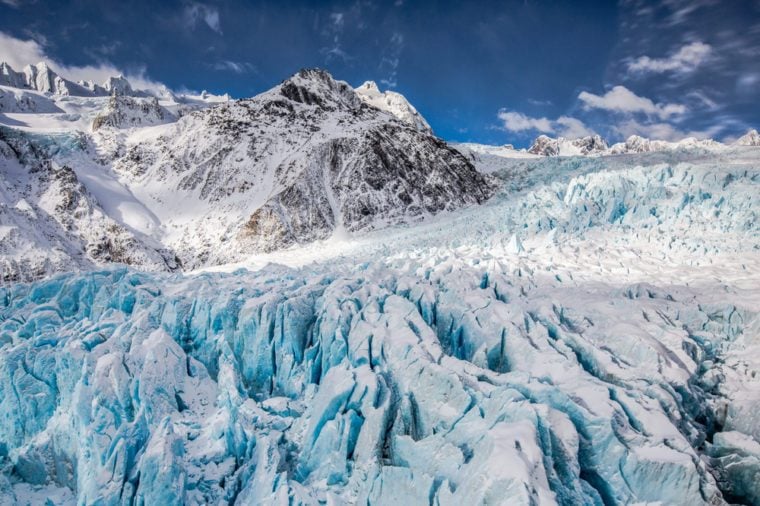
MATT MAKES PHOTOS/SHUTTERSTOCK
Franz Josef Glacier, New Zealand
Similar to Fox Glacier, Franz Josef Glacier also cascades down from the Southern Alps into the rain forests of Westland National Park in New Zealand. It is the steepest glacier in all of New Zealand, descending from a height of about 1.9 miles above sea level to about 787 feet elevation, and it does this over a distance of about 6.8 miles. As a result of its rapid movement of almost 20 inches per day, Franz Josef is home to a plethora of breathtaking ice caves, tunnels, and other icy phenomena.
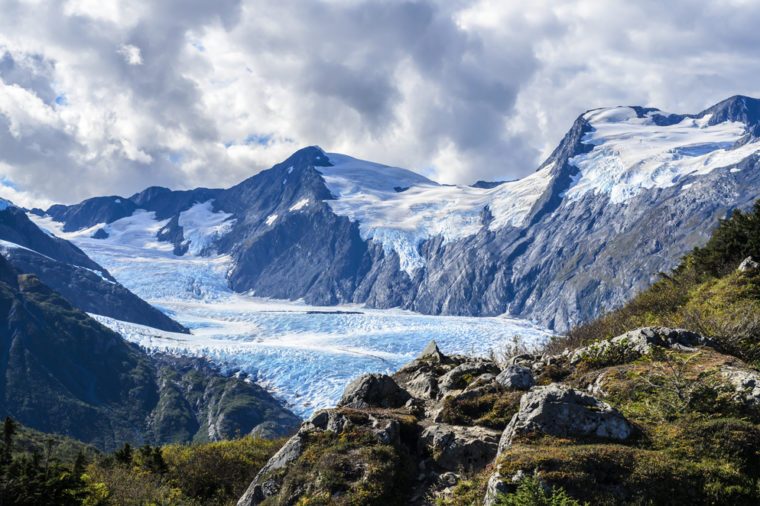
SUSAN R. SERNA/SHUTTERSTOCK
Portage Glacier, Alaska
Located in Chugach National Forest about 50 miles south of Anchorage is the gorgeous Portage Glacier. Although Portage Glacier is retreating, there are still plenty of ways for visitors to view it: Take a sightseeing boat cruise on Portage Lake or venture down one of the many foot trails leading to the glacier. Check out these stunning photos of national parks covered in snow.
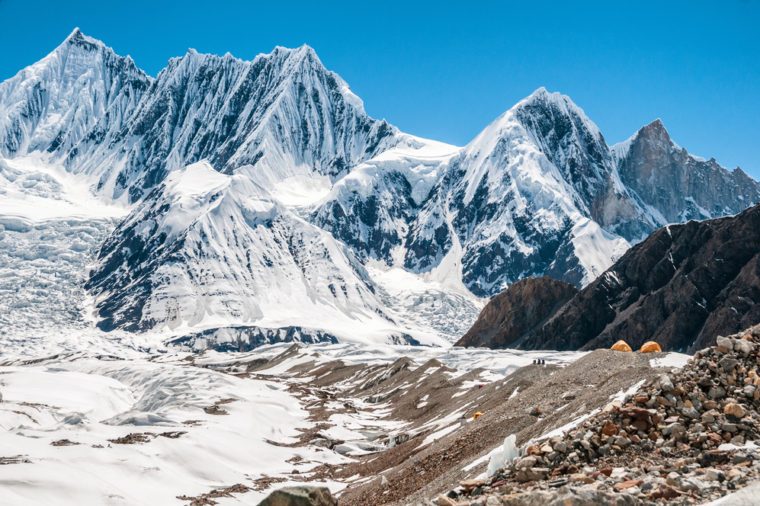
PIOTR SNIGORSKI/SHUTTERSTOCK
Baltoro Glacier, Pakistan
Spanning nearly 40 miles, Baltoro Glacier sits in the Gilgit-Baltistan region of Pakistan. It is the second-longest non-polar glacier in the entire world. Baltoro Glacier runs through part of the Karakoram mountain range, creating an unreal panoramic view of the mountainous region of northern Pakistan.
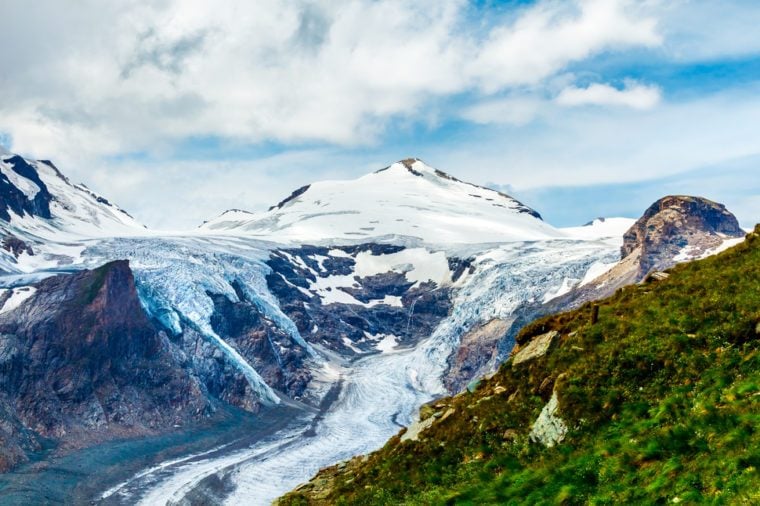
YASONYA/SHUTTERSTOCK
Pasterze Glacier, Austria
As the biggest glacier in Austria and the longest in the Eastern Alps, the awe-inspiring Pasterze Glacier in western Austria is a must-see. Unfortunately, the glacier has been retreating since 1856, report NASA scientists. The ice volume could be reduced by 24 to 63 percent by the end of the 21st century. Here are some other breathtaking places you need to visit before they disappear.
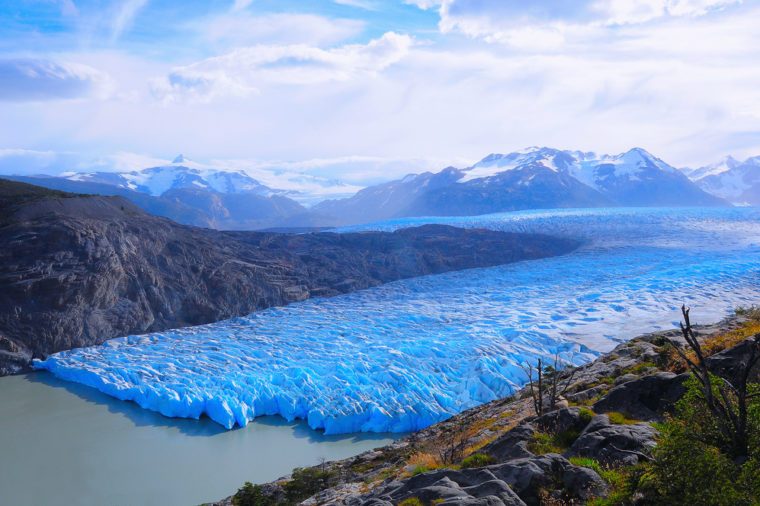
SERJIO74/SHUTTERSTOCK
Grey Glacier, Chile
Situated in the Torres del Paine National Park in Chile, Grey Glacier has a total area of a little over 104 square miles with a length spanning about 17.4 miles, according to measurements taken in 1996. The glacier lives up to its name: Its grey-brown hues are the result of the soil and rock debris it accumulates as it flows downhill.
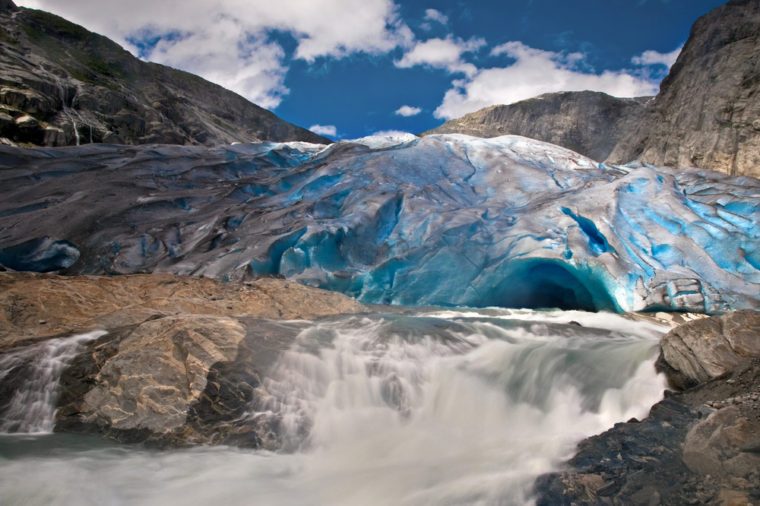
NICRAM SABOD/SHUTTERSTOCK
Jostedalsbreen Glacier, Norway
Stretching approximately 50 miles and covering 183 square miles, Jostedalsbreen Glacier is the largest glacier in all of Europe. This massive glacier stores enough fresh water to fill 300,000,000,000 bathtubs; that could supply Norway with water for over a century. Don’t miss these other stunningly colorful natural wonders on Earth.
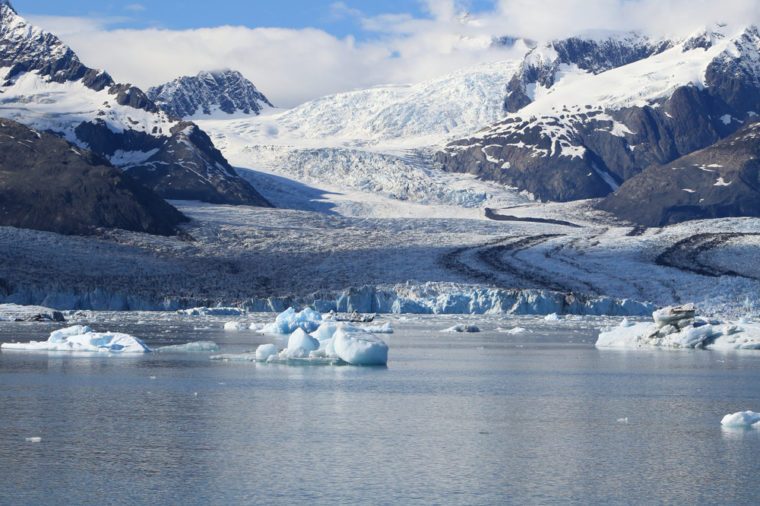
FRANK FICHTMUELLER/SHUTTERSTOCK
Columbia Glacier, Alaska
Located in southeastern Alaska, Columbia Glacier descends from an ice field 10,000 feet above sea level, down the sides of the Chugach Mountains, and into Prince William Sound. This gorgeous tidewater glacier was first discovered in 1794. However, its nose, or terminus, has retreated more than 12 miles in the past three decades. As a result, the glacier has significantly thinned and lost about half of its total thickness and volume since the 1980s. In fact, “this one glacier accounts for nearly half of the ice loss in the Chugach Mountains,” according to NASA scientists.
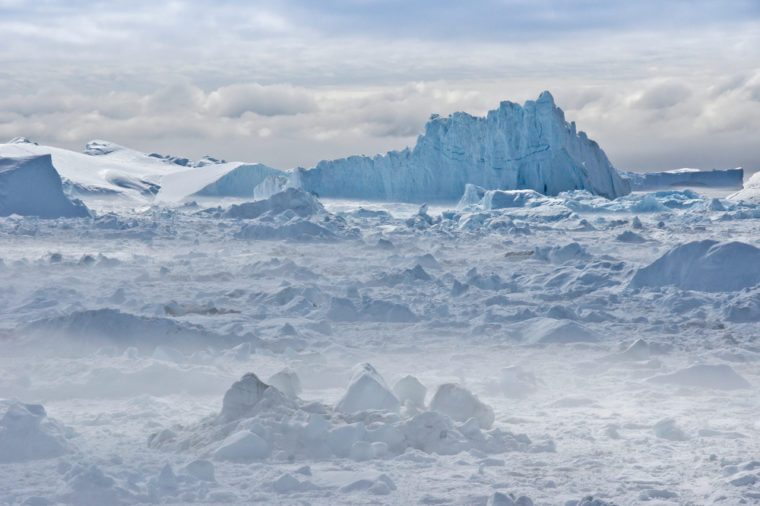
MICHELEB/SHUTTERSTOCK
Sermeq Kujalleq Glacier, Greenland
Moving about 131 feet every single day, Sermeq Kujalleq is the fastest-moving glacier brook on earth. Every year, Sermeq Kujalleq calves around 11 cubic miles of ice and produces a tenth of all of Greenland’s icebergs; the largest bergs measure up to 0.36 cubic miles. According to Greenland scientists, “An iceberg of this size could supply the population of Denmark with water for almost seven years.” By the way, you need to see these unreal deep-sea photos from around the world.














